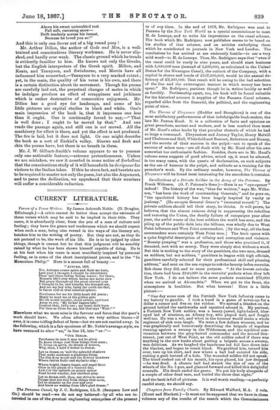Recollections of a Private Soldier in the Army of the
Potomac. By Frank Wilkeeon. (G. P. Putnam's Sons.)—Here is an "eye-opener" indeed ! The history of the war, "thus far written," says Mr. Wilke. son, "has been the work of commanding Generals," and he goes on, "the epauletted history has been largely inspired by vanity or jealousy." (He excepts General Grant's "immortal record.") The private soldiers should tell their story, he thinks. It will prove, he believes, that the almost ruinous delay in suppressing the rebellion and restoring the Union, the deadly failure of campaigns year after year, the awful waste of the best soldiers the world haa seen, and the piling up of the public debt into the billions, was wholly due to West Point influence and West Point commanders. [By the way, all the beet oommanders were certainly West Point men.] The book opens with a quite frightful description of villainy and corruption and violence. " Bounty-jumping " was a profession, and those who practiaed it, if detected, met with no mercy. They were simply shot without a word. Bat this is nothing to the story of the gamblers, the two men, dressed as soldiers, bat not soldiers, "gamblers in league with high officials, gamblers carefully selected for their professional skill and pleasing address," and sent on the sea-voyage to rob the boanty-laden recruits. Rob these they did, and to some purpose. "At the lowest calculi'. tion, there had been $240,000 in the recruits' pockets when they left New York. I do not believe the some pockets contained $70,000 when we arrived at Alexandria." When we get to the front, the atmosphere is healthier. But what horrors ! Here is a little picture :— " One day some men of the Fortieth New York Infantry came to my battery to gamble. I took a hand in a game of seven-up for a dollar a corner and five on the rubber. We spread a blanket on the ground behind the earthworks and squatted around it. My partner, a Fortieth New York soldier, was a heavy.jawed, light.haired, blue- eyed lad of nineteen, an Albany boy, who played well, and fought well too. He was a wit, and when in the humour would make a whole regiment of sick men laugh. We were a few dollars winners, and he was graphically and humorously describing the brigade of regulars running against a swamp in the Wilderness, and the mythical con- versation between the grey-haired commander and the second lieu- tenant, jest out of West Point, as the old soldier asked if there was anything in the new books about getting a brigade across a swamp, was delicious. As we laughed the handsome lad fell face down into the blanket, and began to vomit blood. We grabbed him, turned him over, tore up his shirt, and saw where a ball had entered his side cutting a gash instead of a hole. The wounded soldier did not speak. The blood rushed out of his mouth, his eyes glazed, his jaw dropped —he was dead. A chance ball had struck the tire of one of the wheels of the No.1 gun, and glanced forward and killed this delightful comrade. His death ended the game. We put his body alongside of a couple of other dead men, and buried the three that night."
And the book is fall of pictures. It is well worth reading,—a perfectly candid story, we should say.


































 Previous page
Previous page